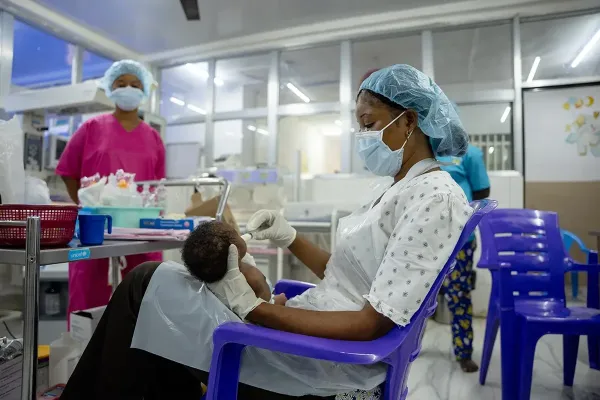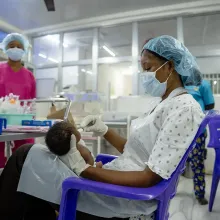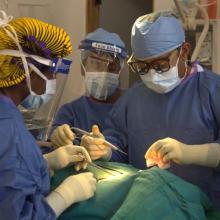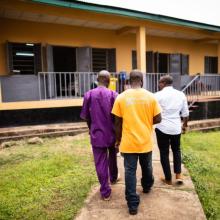Nurses play an essential role in advancing the mission of Partners In Health (PIH), accompanying patients and providing lifesaving care to those who need it most. At PIH, nurses and midwives comprise over 50 percent of our clinical workforce and are integral to delivering comprehensive, patient-centered care. As we celebrate Nurses Week, we want to highlight our Nurses as Change Agents Program (NCAP) through the story of one of our incredible nurse leaders: Vicky Reed, interim executive director of PIH Sierra Leone.
NCAP is foundational to our ability to drive change in nursing care, leadership, and clinical expertise across PIH-supported countries. By investing in crucial programs like the Global Nursing Executive Fellowship, Nursing Centers of Excellence, and scholarships for nurse professional development, we are strengthening the backbone of the global health care workforce at PIH sites around the world—and beyond. According to the World Health Organization, nearly 29 million nurses make up the vast majority of the global health workforce and deliver the bulk of health care services.
Reed joined the PIH Sierra Leone team in 2019 as the director of nursing before becoming the interim executive director in December 2023. During her first few years, she provided one-on-one mentorship for nurses, developed protocols to improve nursing care at PIH-supported facilities, and participated in the Global Nurse Executive Fellowship. Now, she leads with empathy, respect, and tenacity—addressing the challenges and celebrating the accomplishments of all the programs within PIH Sierra Leone.
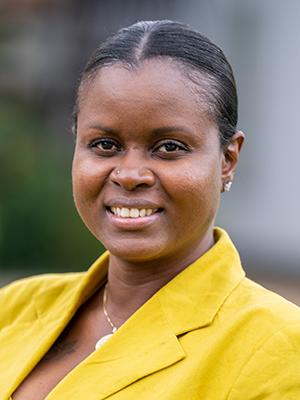
Photo by Asher Habinshuti / Partners In Health
We recently spoke with Reed about her career and the strengths nurses bring to the table as organizational leaders:
What led you to pursue a career in health care?
Some of my earliest memories growing up in Freetown, Sierra Leone, are of the health clinic operated by my grandmother, a nurse, and her friend, a midwife. Patients who had no money at all came into the clinic. My grandmother offered most of her services for free. She treated patients like they were part of her family. I think I always wanted to do something in line with what she did—something of service. [Nursing] was always in the back of my mind.
What brought you to PIH Sierra Leone?
I was one year out of nursing school at Clayton State University in the U.S. when my grandmother passed, and I traveled back to Sierra Leone for the funeral. Crowds came up to me, telling me about how much she did for them. It inspired me to rethink my whole approach to nursing; I’m here to serve people, regardless of their circumstances. While visiting Freetown years later, I shadowed local clinicians. I didn’t realize how bad things were as far as resources, patient care, and the lack of respect nurses had. When I went back to the U.S., I couldn’t stop thinking about my experience. Two years later, I joined PIH Sierra Leone.
What are some skills you learned as a nurse that you think are relevant as a leader?
I always go back and forth about whether to emphasize that, first and foremost, I’m a nurse, because I think that boxes us into what people on the outside say. But we have a unique skillset in multitasking, thinking outside the box, and making things happen with very little. Especially in the resource-limited communities where PIH works, nurses like myself always find creative ways to improvise to get patients the care they need.
How do you see NCAP’s role in supporting up-and-coming nurse leaders?
NCAP in Sierra Leone allowed us to start a powerful mentorship program, recruiting four nurse mentors assigned to the pediatric unit, male and female medical wards, and male and female surgical wards. They have been able to support nurses, in-charges [nurses who oversee the operations of their specific nursing unit], junior nurses, and nursing students. These mentors were starting off with limited skills in terms of management and leadership themselves, so we supported them with rigorous training, allowing them to build their skills and gain self-confidence. So many nurses get thrown into leadership and managerial roles with very limited training, and NCAP has helped to fill those gaps with a ripple effect on the nurses the mentors train.
Could you share an example of how NCAP is improving patient care?
Before, when patients would come in overnight when no pharmacist was on duty, patients would have to wait until the next day to receive medication—an unacceptable situation for those with urgent or painful conditions. Mentors and nurses in charge developed a new system for Emergency Medication Carts to stock key medications in the wards while accurately tracking medication use for the pharmacists. Patients no longer need to wait many hours to receive medication. With the right support, nurses are uniquely positioned to develop this kind of system to improve patient care.
How are you adapting to your new role as interim executive director?
Nurses in Sierra Leone often feel they can’t advocate for themselves. In my previous role as director of nursing, I was constantly thinking of ways to make nurses feel valued and capable. I want the same for our entire staff. The past few years have not been easy ones for PIH Sierra Leone. But looking toward the future, the excitement among my colleagues is palpable. The work can be difficult, but when you look at what we’re accomplishing, it’s all worth it.
What are some goals you have for yourself and PIH Sierra Leone?
My goal is really just to do the best job possible. I hope we can become a role model among PIH’s care delivery sites when it comes to being good stewards of the organization’s resources, development and retention of staff, safeguarding staff and patients, and of course providing good, quality care. I want to be benchmarked against facilities with very high standards, like the U.S. and the U.K.
What inspires you to continue your work with PIH Sierra Leone?
I always wonder if I was not from Sierra Leone, if I would have continued doing this work, but I think it’s worth it. I believe in what PIH stands for. Sierra Leone needed an organization like this that is going to stand for the people when everybody is vulnerable. As much as it’s difficult, this is home and there’s no other place that I’d rather be.
